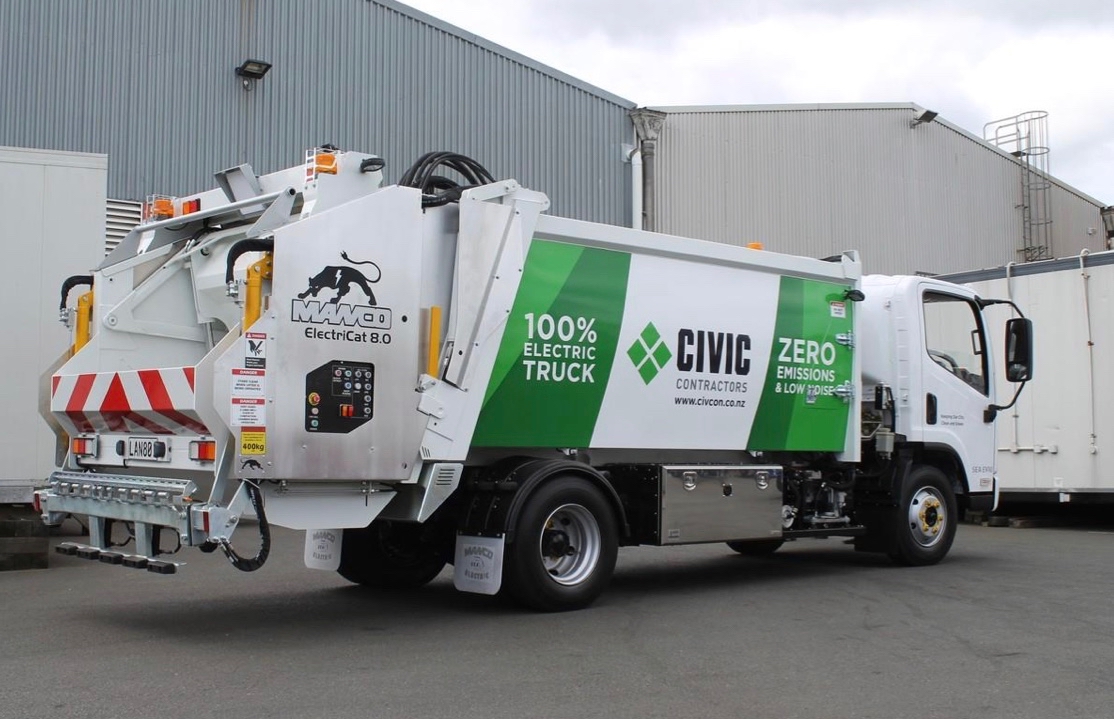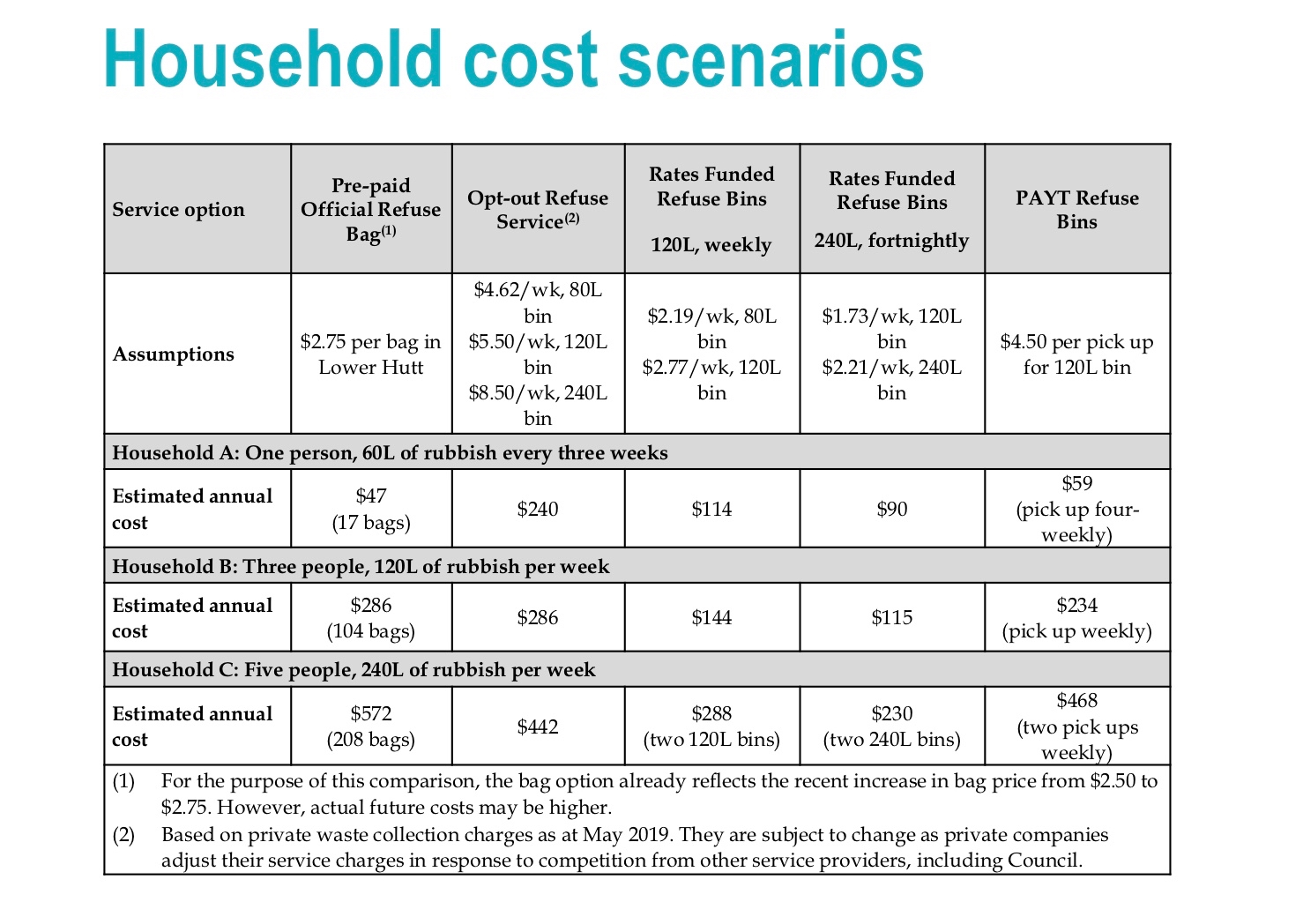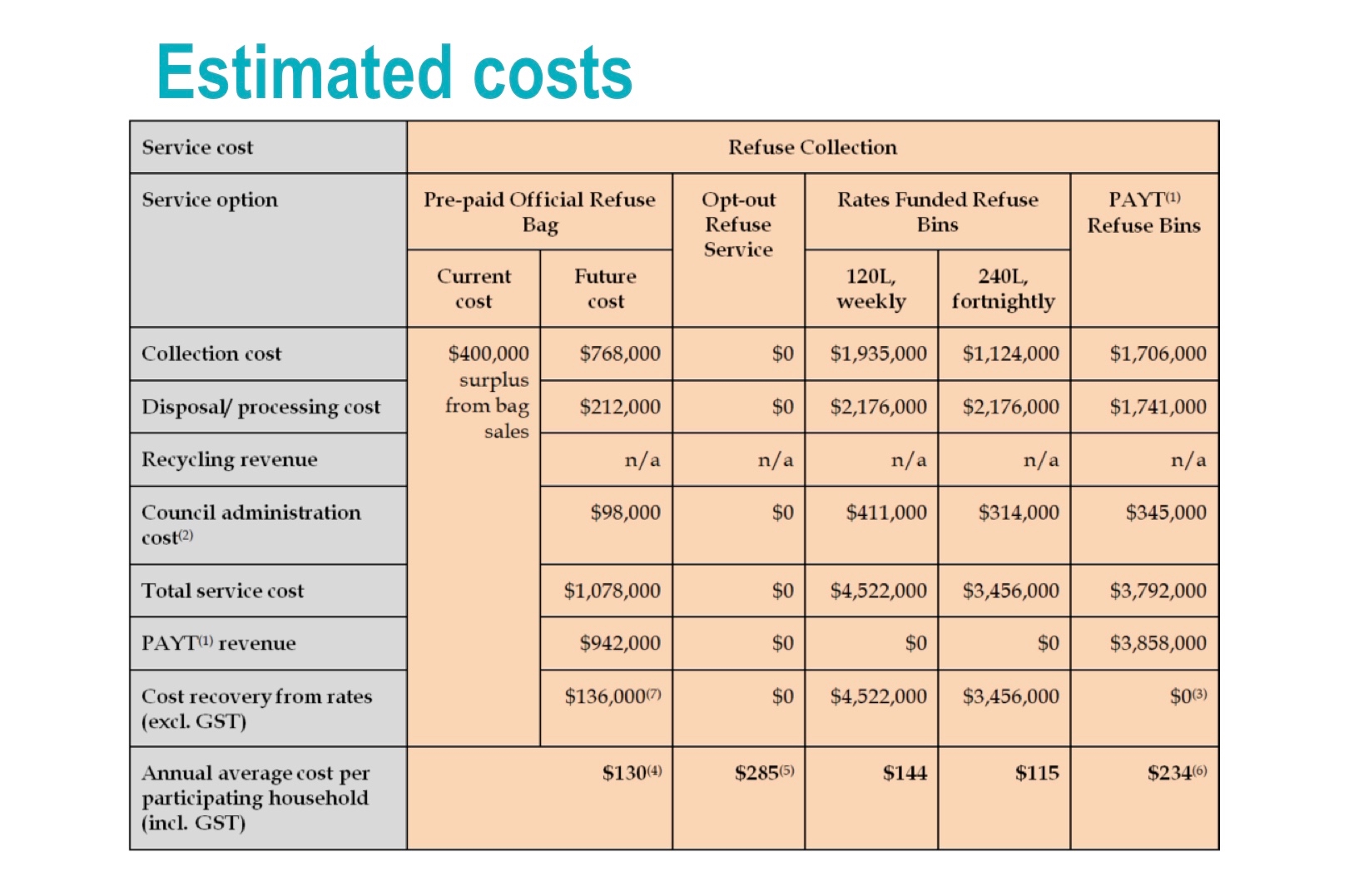The proposed changes to our recycling are surely a no-brainer. But whether Hutt City Council should expand its role in rubbish collection, or just leave it to the market, is far less clear cut.
The two kerbside collection systems are connected. A key issue for me is the risk of contamination of the new recycling wheelie bins by people putting rubbish in with their plastic, paper/cardboard and tins. If there is more than 10% of non-recyclables picked up on a collection round, the whole truck-load goes to the tip. We thus fill up expensive landfill space and defeat the environmental gains.

Bags be gone
About 30% of Hutt households currently put out their rubbish in HCC black plastic bags. The contract with the current contractor, Waste Management, ends in July next year. That company has told us it will not tender for a plastic bag service in future. (That’s not to say it would be impossible to find a refuse collection company willing to pick up plastic bags but – like many bigger councils around New Zealand – HCC intends stopping using plastic bags for rubbish for environmental reasons, cost effectiveness and refuse collection worker health & safety.)
Option 4 in the current consultation document is to leave it to private operators to provide wheelie bin or any other refuse services. I’m really concerned that if we provide a large recycling bin to all households, and we don’t also provide a universal, rates-funded wheelie bin for rubbish -at a size of bin of the household’s choice (Option 1 or 3) – a significant proportion of households, especially those less well off, could end up putting some of their rubbish in the recycling bin.
A wheelie bin has a useful life of about 15 years. Council’s current black plastic rubbish bags comprise about 0.0272kg of plastic. Assuming rubbish collection over a 15 year period and weekly collection frequency, a household would require about 1,560 rubbish bags (weighing about 42kg in total) to deliver the same rubbish capacity as a 120 litre bin.
Electric not diesel
Another issue to ponder is how we encourage recycling and refuse collection companies to switch from fossil-fuel burning trucks to electric trucks. Council signed up to doing something about the climate change emergency. Using electric trucks – if the tender process shows them to be practical and affordable (they are in use in other NZ cities) – would save hundreds of tonnes of greenhouse gases going into the atmosphere every year.

I think use of electric trucks is one of the factors to weigh up as we decide which tender to accept, as are preserving household choice and supporting local companies.
Thanks for sticking with me to get to this point. You could leave this blog now if you wish – but please make sure you have your say on the options for recycling and refuse.
COUNCILLORS HAVE YET TO MAKE ANY DECISIONS. We really need the input of as many Lower Hutt folk as possible to guide us.
Click here for the feedback form.
If you are willing to read on….here’s some more on the issues in depth:
Let’s do the easy one first – recycling.
No more wind-blown recyclables
I haven’t met anyone who doesn’t recognise there are problems with the current 55-litre green crates. For many families, they’re too small. Worse, when it’s windy and/or the collection staff are in a hurry, recyclables get loose and end up in our streets, reserves, streams, rivers and ultimately the harbour/ocean. (Yes, recycling crate nets can stop this but only a fraction of households use them).
Council is proposing giving all households a 240-litre wheelie bin for plastics 1-2, paper, cardboard, tins and cans, and a 45-litre crate for glass. Both would be collected fortnightly.
IMPORTANT: The wheelie bin will have a wind clip. If the bin should be blown over while it’s out on the kerb, the contents shouldn’t spill everywhere. The wind clip doesn’t stop the lid opening when they’re mechanically lifted by the collection truck for emptying. (Note: the wheelie bins of all sizes proposed under the Council-funded rubbish/refuse options will also have wind clips).
Glass separate
Why is a separate crate for glass needed? Glass items co-mingled with other types of recyclables undermines the economic value of what can be recycled to recover some of the collection costs, and is a danger to sorters.
For the current recycling crates, every household is charged a $40 targeted rate on their rates bill. The contract for recycling collection/sorting was signed more than three years ago and is out of date. The markets for many recyclables have fallen away, with many of the Asian counties that used to take these waste materials from Western nations now (quite rightly) saying ‘no more’.
The cost for moving to the wheelie bin/glass crate fortnightly collection combo is $105 per household by way of targeted rate. This takes into account the latest estimated economic value of the glass, paper and metals collected.
The thing is, if we stayed with the current small green crates/weekly collection, the cost is $116 per household, including because they have to be manually handled by collectors.
For some people – e.g. folk who live alone, those who have limited yard space – a 240 litre bin for recyclables is too big. Council is offering the option of a 120-litre bin, but the $105 annual cost by way of targeted rates stays the same.
Before we leave recycling – note one risk. The government is quite rightly keen on better packaging product stewardship, and perhaps may move to insist manufacturers offer refunds on returned plastic bottles, etc. It’s crystal ball gazing stuff what impact those sorts of future changes might have on the economics of kerbside recycling collection.
What about rubbish?
Now it gets more controversial – wheels bins for refuse funded by way of a rates increase, or just leave it to each household to sort out/pay for their own refuse collection?
The options are all clearly set out as part of the consultation document, here.
People will have different views on what suits them best, depending on the number of people in their household, the different costs, whether they have plenty of room to store wheelie bins on their property (one for recycling, one for refuse) and whether it’s easy for them to get those wheelie bins to their gate for weekly/fortnightly collection.
The consultation period runs until 16 August. It’s over to you to tell the Council your preference for the four options.

It’s been estimated (using the widely recognised and used Better Business Case criteria) that providing every Hutt household with a 120 litre rubbish bin and collecting it weekly will add a total of $4.52m (about 4%) to the annual rates take by way of a $144 targeted rate per household. Providing everyone with a 240 litre bin and collecting it fortnightly (alternating with recycling collections, so there aren’t too many bins cluttering up the roadside at a time) will add $3.45m to the rates ($115 per household).
Don’t believe some of the recently publicity that with rates funded refuse collection, there will be no choice over size of bins. Both Options 1 & 3 will allow households to choose smaller bins (80 litres) at a lower cost ($80 a year fortnightly collection, $114 a year weekly collection), if they generate less waste/recycle more.

For most households, these targeted rates are significantly below what they can currently access by choosing wheelie big options offered by private companies. Logic says this is true because contracting city-wide offers economies of scale. However, some people are already telling us in feedback they are currently able to access cheaper collection prices. You’ll have to compare the estimated costs of the council services with what you currently pay to work out your own circumstances.
These are some other concerns that have been raised:
- A single council-funded refuse collection service is too big for smaller, local companies to successfully tender for. The result will be a monopoly, and in the long run we’ll pay a lot more because all the other companies will be driven out.
Comment: It’s a risk that certainly deserves close consideration.
However, IF the council decides on a rates-funded option, the contract we sign for services from 1 July next year will be an eight year contract, with stipulated price increases relating to inflation, increases in the Waste Disposal Levy, emissions trading scheme changes, etc.
Though we are the seventh largest city in NZ, we’re still small in the overall waste market. There are a number of large waste companies and when it comes to re-tendering for Hutt services some time late in the 2020s, it’s considered very likely there will be competing tenders.
- The government is increasing the Waste Disposal Levy, and it we go for rates-funded refuse collection, ratepayers will foot the bill.
Comment: This is a complete and utter red herring. The government has announced that over the next four years, the cost of dumping rubbish in landfills (not just ‘A’ class landfills such as Silverstream Landfill, but all landfills) will rise from $10 per tonne to $60 per tonne. So yes, this will, affect refuse collection prices. But it will affect those prices whether or not it’s a council-funded or privately contracted service.
- I have a steep drive/steps that makes wheelie bins difficult. We’re a very small household, and even an 80-litre bin collected fortnightly is too big. I live in a block of flats; there isn’t enough space for whole lots of wheelie bins.
Comment: These are all fair points to raise. With a rates-funded system, even with choices on size of bins, it can only be designed to suit the vast majority of people (perhaps 70-80%) with costs kept down through economies of scale. For the others, what they can obtain out in the private market (Option 4) or the Pay As You Throw (Option 2) may suit them better.
For older people and those with disabilities, under the rates-funded options 1 and 3, a wheel in and wheel out bin service (up and down driveways, etc) would be offered at an average household cost, subject to qualifying criteria.
With multi-unit apartments and rural properties for which 80-240 litre bins may not be suitable, alternative services would be available under options 1, 2 and 3, such as providing a 600 litre shared bin.
There is a lot more information available in the consultation document and on the Council website. If you can find the answer to your question, I’d be more than happy to try and find you the information (please email simon.edwards@huttcity.govt.nz)
Please make sure you have your say by 16 August to help councillors make the best decision going forward. There’s a lot at stake.

I want to know can I add ordinary garden rubbish, that I cant put in my compost bin and other bits and pieces of rubbish, that isnt 1 and 2 in the wheelibin. Currently I get a wheelibin collected once a week from my property. If I opt for the 120 litre bin, once a fortnight, can I add ordinary rubbish to it as well.
I find the information a wee bit umbiguous. It says one thing but then it says something different.
Hi Julia – thanks for reading the blog. Your ‘green’ and organic waste that you can’t compost cannot be put into the new lidded wheelie bins for recycling that Council proposes providing to every household. That’s only for plastics number 1&2, plus tin, paper and cardboard. There will be a separate crate for glass.
You will be able to put green waste in your rubbish wheelie bin (whether that is rates-funded and provided by the council, or provided by a private rubbish collection firm).
Council is also offering the option of a 240-litre wheelie bin only for green waste, collected every four weeks. The estimated cost for any household that wants to take that up is $95.
Hope this helps. Hutt City Council’s website has some good information, and please feel free to email me (simon.edwwards@huttcity.govt.nz) or call me (027 484 8892) if you can’t find the answers you need.